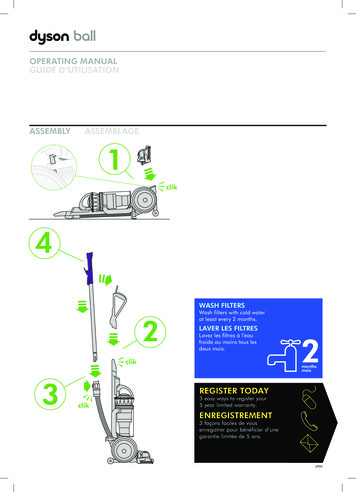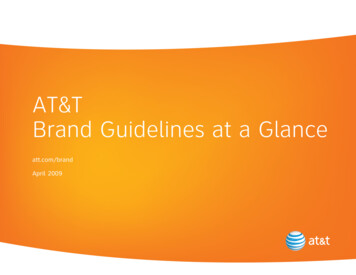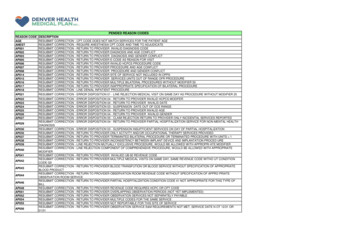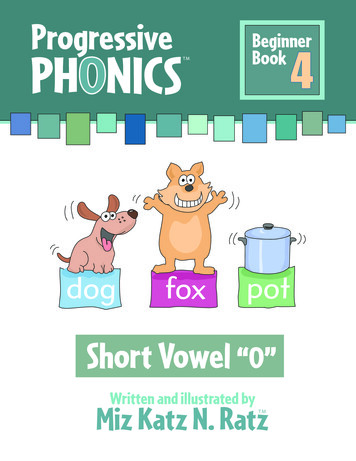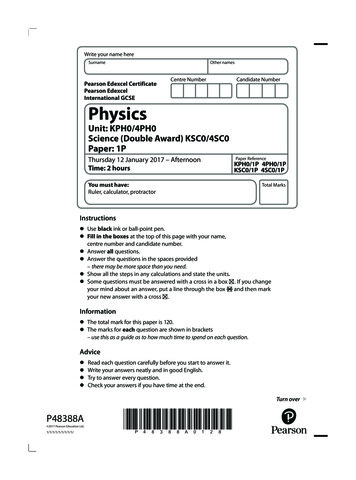
Transcription
RUNNING HEAD: IT’S NOT A PD, IT’S PEDAGOGYIt’s not a PD, It’s Pedagogy: Designing a Restorative Justice Curriculum for Urban SchoolEducators using Community Co-Teaching and Active LearningBettie Ray ButlerCollege of EducationDepartment of Middle, Secondary, and K-12 EducationPhD in Curriculum and Instruction (Urban Education Strand)1
RUNNING HEAD: IT’S NOT A PD, IT’S PEDAGOGY2AbstractRestorative justice (RJ) has gained popularity among educators as a promising alternative toschool suspensions. A growing concern among teachers, however, is that they lack the necessaryunderstanding to effectively implement culturally responsive restorative practices in urbanclassrooms. Currently, RJ training is limited to professional development workshops that occuronly after teachers have entered the profession. The success of RJ requires early ongoingexposure to evidence-based restorative practices to develop a positive school climate, preventdisruptive behavior, and reduce suspensions. This research intends to reform teacher educationcurriculum by proposing that a restorative philosophy be integrated into teacher preparationprograms. Using a combination of community co-teaching and active learning, prospectiveteacher educators, doctoral students in EDCI 8320: Social Deviance, Delinquency, andEducation (Curriculum and Instruction), will bridge research and practice by (1) becomingfamiliar with restorative philosophy; (2) engaging community leaders who have a record ofsuccess implementing RJ practices in urban classrooms; (3) observing and participating in RJprocesses; and (4) planning and developing RJ courses for preservice teachers. At the conclusionof the course, participating doctoral students will co-facilitate a Summit on Restorative Justice inUrban Education for practitioners, policymakers, university faculty, and others to address howinstitutions of higher education can work collaboratively with urban schools/districts andcommunity organizations to narrow the discipline gap and improve academic outcomes. Surveydata collected from the Summit will be empirically analyzed and subsequently compiled into areport to inform RJ initiatives both at the policy level and in practice.Word Count: 249 (excluding the Title)
IT’S NOT A PD, IT’S PEDAGOGY3Budget Request for SOTL GrantYear2016-2017Joint Proposal?Title of ProjectDuration of ProjectPrimaryInvestigator(s)Yes*NoIt’s not a PD, It’s Pedagogy: Designing a Restorative JusticeCurriculum for Urban School Educators Using Community CoTeaching and Active LearningJanuary 2017 to June 2018Bettie Ray Butler, PhDEmail Address(es)bettie.butler@uncc.eduUNC Charlotte SOTLGrants PreviouslyReceived (pleasenames of project, PIs,and dates)N/AAllocate operating budget to Department ofAccount #Middle, Secondary, K-12 Education (MDSK)Year OneJanuary to JuneAwardFaculty Stipend Transferred directly from Academic Affairs to Grantee on May 15911250Graduate Student Salaries911300Special Pay (Faculty on UNCC payroll other than Grantee)915000Student Temporary Wages915900Non-student Temporary Wages920000Honorarium (Individual(s) not with UNCC)921150Participant Stipends925000Travel - Domestic926000Travel - Foreign928000Communication and/or Printing930000Supplies942000Computing Equipment944000Educational Equipment951000Other Current Services 3850 900 4000GRAND TOTAL 8,750
IT’S NOT A PD, IT’S PEDAGOGY4Account #AwardTransferred directly from Academic Affairs to Grantee on MayFaculty Stipend 15Year TwoJuly to June 7020911250Graduate Student Salaries911300Special Pay (Faculty on UNCC payroll other than Grantee)915000Student Temporary Wages915900Non-student Temporary Wages920000Honorarium (Individual(s) not with UNCC)921150Participant Stipends925000Travel - Domestic926000Travel - Foreign928000Communication and/or Printing930000Supplies942000Computing Equipment944000Educational Equipment951000Other Current Services 1000 750 3900GRAND TOTAL 12, 670Attachments:1.Attach/provide a narrative that explains how the funds requested will be used.2.Has funding for the project been requested from other sources? Yes * No.If yes, list sources.
IT’S NOT A PD, IT’S PEDAGOGY5Budget NarrativeThe funds for the proposed study will be used in four (4) distinct ways: 1) to compensateexternal consultants; 2) to provide research support and participant incentives; 3) to coverexpenditures for supplies and services; and 4) to provide a faculty research stipend to theprincipal investigator (PI).External Consultants ( 5000)Funding for the proposed study will be used to secure two (2) external consultants. Bothconsultants possess a demonstrated expertise in the facilitation of restorative practices; a skill setthat is currently unavailable at UNCC. Two separate consultants are needed because they eachprovide a unique approach to restorative justice. One specializes in criminal justice (focusing onmediation and reconciliation with juvenile offenders), and the other in education (focusing onclassroom management strategies and interventions for African American males).Martin E. Price, JD is a nationally and internationally recognized pioneer and leader inRestorative Justice. As the Director of the Victim-Offender Reconciliation Program (VORP) inCharlotte and an Advisor to the Capital Restorative Justice Project in North Carolina, Price hassought to bring restorative justice reform to criminal justice systems. He has been featured on20/20, Oprah, the A&E series Confrontation, and other reputable television programming.Additionally, Price has taught graduate and undergraduate students how to apply culturallyappropriate restorative practices for youth/juvenile offenders. As a two-time Fulbright SeniorScholar, Price’s teaching has received notable recognition as his highly interactive pedagogicalapproach has span the globe (U.S., Mexico, Central America, Central and Eastern Europe) inhigh demand. The PI intends to utilize Price’s expertise to give participating doctoral students, inEDCI 8320: Social Deviance, Delinquency in Education, extensive firsthand exposure to
IT’S NOT A PD, IT’S PEDAGOGY6restorative processes. Using active learning, Price will facilitate four (4), 2-hour group sessions( 250 p/h consulting fee) with students enrolled in the doctoral seminar to walk them through thestep-by-step process of using reconciliation and group mediation to reduce recidivism amongthose labeled juvenile delinquents.Brian Bulluck has over 20 years of experience in developing and implementing culturallyresponsive classroom management strategies that integrate a restorative philosophy. As a localBehavioral Modification Technician (BMT) within a large urban school district, and criticallyacclaimed author of the ABC’s of Classroom Management, Bulluck has devoted his career toapplying restorative approaches to school discipline that work to prevent, or deescalate,inappropriate and/or disruptive behavior in the classroom. Bulluck’s approach to RJ is uniquefrom that of Price in that he develops restorative interventions which are largely used in urbanclassrooms for students with disabilities, as well as, students of color (namely African Americanmales). The PI intends to utilize Bulluck’s specialized knowledge to give participating doctoralstudents an opportunity to engage in critical conversations with a community leader who has arecord of success implementing RJ practices in urban classrooms for African American students.Using, community co-teaching, Bulluck will teach four (4) of the sixteen (16) lessons for EDCI8320. During this time, in collaboration with the PI, Bulluck will present evidence-basedrestorative strategies and interventions that he has personally developed and has foundsignificant and positive effects among students with whom he has interacted.Both consultants will be invited to present at the Summit on Restorative Justice in UrbanEducation as featured guest speakers. Each will be given an honorarium of 500.
IT’S NOT A PD, IT’S PEDAGOGY7Research Support and Participant Incentives ( 8670)Funding for the proposed study will grant financial support to one (1) PhD studentactively enrolled in the Curriculum and Instruction doctoral program. This student is expected towork closely with the PI to provide a total of 880 hours of research support (estimated @ 9.00p/h, 20 hours per week, for 44 weeks) over the duration of the proposed 2-year project;beginning Summer I (2017) and extending to Summer I (2018). The designated graduateresearcher will work alongside the PI and assist with data collection, research analysis, andsurvey administration directly associated with the proposed project.In addition to graduate student research support, there is a need to encourage on-goingparticipation in the proposed study, beyond the course (EDCI 8320), among participatingdoctoral students. As such, doctoral students that: a) engage in continuous professionaldevelopment opportunities, provided by the PI and the Center for Teaching and Learning (CTL),to further develop their RJ courses; and b) who commit to presenting their course designs at theSummit on Restorative Justice in Urban Education (via roundtable, conference-stylepresentation, or poster) will, in turn, receive a 50 gift card (estimated @ 50 per student, 15students maximum course enrollment).Supplies and Services ( 3900)Funding for the proposed study will be used to purchase supplies for the Summit onRestorative Justice in Urban Education. The following list identifies communication/reportingmaterials needed to accommodate Summit participants: notebooks ( 6.00 each tax), bags ( .81each tax), writing instruments ( .50 each tax), USB flash drives ( 4.00 each tax), andevent posters that display the Summit agenda ( 89.97 tax). All quotes are provided byDiscount Mugs (total 1220.97 tax) with the exception of the event posters (quote provided by
IT’S NOT A PD, IT’S PEDAGOGY8Staples). It is estimated that the Summit attendance will be approximately 75-100 participantsinclusive of local and state practitioners, policymakers, university administration, and others(faculty, community leaders, etc.).Additionally, it is the intention of the PI to host the Summit at the UNCC Center CityCampus. As such there are two service charges that will be incurred to use this location: a) spacerental ( 150) and; b) tech support ( 30 p/h @ 8 hours). Meals for Summit participants will alsobe provided. Funds have been budgeted for breakfast ( 891.25) and/or lunch ( 1117.00) duringthe event through Chartwells Catering at UNCC. The total estimated service costs are roughly 2398.25 (not including taxes or additional fees).Faculty Research Stipend ( 3850)Funding for the proposed study will be used to provide a faculty stipend to the PI tocontinue research activities associated with the proposed grant during Summer I (2017) (theresearcher is not scheduled to teach during this period). At this time the researcher plans to edit,finalize, and post (online) the survey (pilot instrument designed in EDCI 8320 to assessperceptions of, and competence in, restorative justice), as well as, to begin planning for theSummit on Restorative Justice in Urban Education (e.g., developing the agenda, creating aprospective invitation list, booking featured speakers, purchasing supplies and services)- whichis scheduled for Spring, 2018.
IT’S NOT A PD, IT’S PEDAGOGY9Office of the Dean9201 University City Blvd., Charlotte, NC 28223-0001(704) 687-8722, www.uncc.eduOctober 26, 2016Scholarship of Teaching and Learning Grants CommitteeCenter for Teaching and LearningUNC Charlotte9201 University City BoulevardCharlotte, NC 28223Dear SoTL Grant Selection Team,I enthusiastically support the project designed by Bettie Ray Butler called, “It’s not a PD, It’sPedagogy: Designing a Restorative Justice Curriculum for Urban School Educators usingCommunity Co-Teaching and Active Learning.” The content of the professional developmentshould and can be incorporated into our teacher preparation program, and I applaud Dr. Butler indoing so. I am also excited by the summit she will hold for all of us on the topic following theproject. Our College is involved in much diversity work and this project will contribute to itgreatly.It is no secret that exclusionary discipline practices have historically had adisproportionate and detrimental impact on marginalized students. With the growingoverrepresentation of racial and ethnic minorities for school suspensions nationally; schooldiscipline has easily become one of the most pressing and emergent issues facing schoolstoday. For this reason, Dr. Butler’s proposal is a much needed research effort. Herpedagogical ingenuity to integrate community co-teaching and active learning amongprospective teacher educators (PhD students), community leaders, the Race Matters forJuvenile Justice (RMJJ) initiative in Charlotte and the locally based Victim-OffenderReconciliation Program (VORP), exemplifies the type of forward-thinking and solutionoriented mindset that supports the spirit of community collaboration and therebyadvances the mission of the University of North Carolina Charlotte and especially that ofthe College of Education.Our College recognizes that P-12 classrooms are becoming more and more diverse which iswhy our existing curriculum develops the kinds of competencies that help prepare ourcandidates to teach in increasingly diverse settings. Yet and still school discipline andclassroom management remain a top concern for many pre-service and novice in-serviceteachers as they enter the classroom. This is an important area of curriculum developmentnot just for our College, but others as well. Integrating restorative justice into the teacher
IT’S NOT A PD, IT’S PEDAGOGY10preparation curriculum as Dr. Butler has proposed could greatly benefit our students at alllevels. The idea of guiding prospective teacher educators to develop restorative justicecurriculum that will give teacher candidates early ongoing training is intriguing. I see thishaving a national impact as Dr. Butler’s doctoral students use this curriculum in the teachereducation programs in which they are placed post graduate school. With this in mind, Icannot say enough, how eager I am to see the results of Dr. Butler’s summit and even moreinterested to learn about how we can infuse restorative justice here in our very ownCollege.Dr. Butler is an outstanding teacher and excellent citizen of the College of Education. I have nodoubt she will uphold her responsibilities as a grantee, including being an excellent steward ofUNC Charlotte funds. Should you have any questions, please do not hesitate to contact me.Sincerely,Ellen McIntyre, DeanCollege of Education
IT’S NOT A PD, IT’S PEDAGOGY11
IT’S NOT A PD, IT’S PEDAGOGY12Word Count: 2497Project NarrativeThe purpose of this research is to reform teacher education curriculum by proposing thata restorative philosophy be integrated into teacher preparation programs. The specific aim, orlarger goal, of this project is to provide pre-service teachers with a better understanding of howto reduce racial and socioeconomic disparities in school discipline by effectively implementingculturally responsive restorative practices in urban classrooms. To achieve this goal, this projectuses a combination of community co-teaching and active (experiential) learning to exposeprospective teacher educators, urban education doctoral students enrolled in EDCI 8320: SocialDeviance, Delinquency, and Education (Curriculum and Instruction), to theory, research, andpractice on successful evidenced-based restorative interventions and strategies most effectivewith students from culturally diverse backgrounds. By adopting this pedagogical approach,prospective educators will learn how to design culturally responsive restorative justice (RJ)courses. All enrolled students will have a unique opportunity to present their proposed courses,along with, their recommendations for best practices in school discipline to an audience of stateand local educational stakeholders directly involved in making curriculum decisions concerningteacher preparation programs. The dissemination of recommendations for policy and practicewill be highlighted during a Summit on Restorative Justice in Urban Education hosted by the PIand participating doctoral students.This project aligns with the broader mission of UNC Charlotte (UNCC) to createmeaningful collaborations with community leaders and to promote and sustain a robustintellectual environment that values cultural diversity. In like manner, this project also advancesthe diversity initiatives of the College of Education which focuses on preparing teacher
IT’S NOT A PD, IT’S PEDAGOGY13candidates to teach in increasingly diverse schools by providing culturally relevant instructionthat places special emphasis on equity and inclusion.Objectives. The objectives of this project are:1) Expose teacher educators to restorative philosophies. This will beaccomplished by assigning interdisciplinary readings that introduce studentsto the fundamental principles of restorative justice as explained in criminologyand education disciplines.2) Engage community leaders who have a record of success implementing RJpractices in urban classrooms. This will be accomplished by having BrianBulluck (a local community leader, Behavioral Modification Technician at alocal disciplinary alternative school, and author of the The ABC’s ofClassroom Management) co-teach four (4) of the sixteen (16) lessons forEDCI 8320. Bulluck will present evidence-based restorative strategies andinterventions that he has personally developed and found significant andpositive effects among students of color.3) Observe and participate in RJ processes. In collaboration with the VictorOffender Reconciliation Program (VORP; a community-based organization inCharlotte that provides training on how to implement restorative practicesusing mediation and reconciliation) and Race Matters for Juvenile Justice(RMJJ; a programmatic initiative in Charlotte to reduce disproportionality inthe juvenile justice system), enrolled students will have an opportunity toexperience, firsthand, the interplay of RJ processes.
IT’S NOT A PD, IT’S PEDAGOGY144) Plan and develop RJ courses for preservice teachers. The instructor will assistenrolled students in designing culturally responsive RJ courses for teacherpreparation programs.Research questions. The research questions to be addressed are:1) Do principals and in-service teachers feel that early ongoing exposure toculturally responsive restorative practices will help reduce office referrals forschool suspensions?2) Do school board members feel that integrating a district-wide restorativeapproach to school discipline reform will help to reduce school suspensions inurban school districts?3) Do deans of colleges of education feel that integrating a restorativephilosophy in the teacher education curriculum will help teacher candidatesimprove classroom management skills that reduce the number of disciplinaryincidences?RationaleCharlotte, North Carolina is the latest city to propose the use of a moratorium for out-ofschool suspensions in response to the ubiquitous and pervasive inequities in school discipline. InApril 2016, WBTV news dedicated a 1-hour segment to investigate the racial divide with respectto school punishment in NC schools. Charlotte Mecklenburg Schools (CMS), one of the largesturban school districts in the state, reportedly issued 22,196 short-term school suspensions, ofwhich 12,461 were for Black male students compared to 1,159 for White males (WBTV, 2016).While CMS is working aggressively to respond to the discipline crisis; paradoxically, the District
IT’S NOT A PD, IT’S PEDAGOGY15currently has no viable alternative for school suspension in place. Given the timeliness of thistopic, there is a great need and high demand for a study such as the one proposed here.Furthermore, since a large percentage of CMS teachers are also UNCC graduates, itseems intuitive that the two institutions would partner together with the community to helpmitigate the discipline crisis. The principal investigator (PI) is presently collaborating withselected CMS school board representatives on related matters (redesigning disciplinaryalternative education) and has found the Board to be extremely receptive towards innovative andprogressive initiatives that identify alternatives to school suspensions.ImpactParticipants in the proposed Summit will be asked to complete a pre- and post-testquestionnaire on their feelings and understandings of RJ. Participant responses will be analyzedusing a combination of qualitative and quantitative methods. The findings of this study willinform RJ initiatives both at the policy level and in practice. This study will impact UNCCteaching and learning at the doctoral level by using pedagogical ingenuity (community coteaching and active learning) to shape how prospective teacher educators design curriculum.Additionally, this study will also create meaningful community partnerships that developcollaborative, co-constructed initiatives that work to narrow discipline disparities locally. Withfurther refinements, this local initiative (established from this project) has the potential to reformcurricula in teacher preparation programs across U.S. colleges and universities, as well as, tocreate a model of engagement through school/university/community partnerships that could beimplemented nationally to reduce suspensions in urban schools/districts.
IT’S NOT A PD, IT’S PEDAGOGY16Literature ReviewThe overrepresentation of students of color for exclusionary discipline has been a topic ofcontention for nearly four decades. With the publication of the CDF (Children’s Defense Fund)report in 1975, it was determined that Black students, in comparison to Whites, were three timesmore likely to be suspended for committing the same or similar offense. While a significantnumber of students, overall, faced exclusionary consequences for nondangerous and nonviolentinfractions; the consequences for each violation varied across race and class and wereinconsistently and arbitrarily applied. This provided clear evidence of racial and socioeconomicdisproportionality in the administration of school discipline.Today the discipline problem has worsened; impacting millions of students annually.Even though Black students comprise only 15.5% of the national student enrollment,approximately 39.3% of all out-of-school suspensions are meted out to African Americans (U.S.Department of Education, 2014). With this in consideration, practitioners, policymakers, andresearchers alike are making a concerted effort to understand how to reduce disparities in schooldiscipline. A national call to proactively redesign and reform school discipline policy has beenissued.School Discipline Reform: The Need for ChangeNationwide, more than 2.8 million K-12 students (unduplicated) are suspended out-ofschool at least once per academic school year (OCR, 2016). This number typically doubles (5.6million) if calculating suspensions (duplicated) instead of students. Because, on average, mostsuspensions range between 2-3 days; each year an estimated 11.2 million days of instruction timeis lost (Losen, 2015).
IT’S NOT A PD, IT’S PEDAGOGY17Looking closely at racial patterns in achievement, research suggests that classroom timemissed as a result of disciplinary action further exacerbates negative academic and life outcomes,particularly for students of color (Gregory, Skiba, & Noguera, 2010; Lewis, Butler, Bonner,Joubert, 2010). Intuitively, if a student is not in school they are not learning the essential skillsnecessary for success in a highly competitive, global market. Hence, it is plausible to concludethat extended time away from the instructional environment places a student at significant riskfor long-term academic, social, and emotional (and perhaps, psychological) instability. Theserisks are known correlates of criminal behaviors. And herein lies the guiding logic behind theschool-to-prison pipeline; a hypothesized framework which links the actions of schools (thesubjective application of exclusionary discipline) with the subsequent involvement of youth inthe juvenile/criminal justice systems (Krezmien, Leone, & Wilson, 2014).Considering the theoretical parallels between the achievement gap (or the ‘opportunitygap’), the discipline gap, and disproportionate minority contact in the justice system, the U.S.Department of Education (2014) encouraged educators to use out-of-school suspensions only asa “last resort.” The urgency to advance school discipline reform efforts, by identifying viableevidence-based solutions that work to remedy excessive school exclusion, has been attributed tothis national call for a moratorium on out-of-school suspensions.The Promise of Restorative Justice: A Viable, Evidence-Based SolutionSchools around the globe (i.e., Australia, New Zealand, and Japan) have recently begunto adopt restorative justice (RJ) practices. This is in part due to the wide use of RJ as a promisingalternative to suspension (Skiba & Losen, 2016). Using a three-tiered approach, RJ focuses onprevention (Tier 1), intervention (Tier 2), and reentry (Tier 3) as a method to improve schoolclimate and reduce disparities in school discipline. By establishing a sense of community (Tier
IT’S NOT A PD, IT’S PEDAGOGY181), building relationships through group mediation (Tier 2), and creating assimilative spaceswhereby students can successfully reintegrate back into the classroom after having committed aninfraction (Tier 3); RJ shows great potential to drastically reduce problem behaviors so that everystudent can learn, fully engage in a rigorous curriculum, and feel safe, nurtured, and welcome(U.S. Department of Education, 2014).Despite its infancy, RJ is now gaining tremendous momentum in the U.S. (i.e., Colorado,California, and Minnesota) as a result of empirical investigations of its impact. Currently, there isa growing body of evidence that suggests schools which implement RJ significantly improveboth academic and discipline-based outcomes. For example, in Oakland, California RJ schoolsmade notable gains in attendance, achievement, and graduation rates; all the while reducing thediscipline gap (Jain, Bassey, Brown, & Kalra, 2014). Within a 3-year period, schools in Oaklandthat practiced RJ experienced a cumulative reduction in chronic absenteeism (dropped 24%compared to 62.3% increase for non-RJ schools), growth in reading proficiency (percent changeof roughly 135%), and increases in four-year graduation rates (cumulative increase of 60%,compared to 7% for non-RJ schools). During the same period, the percent of students who weresuspended over time fell substantially (decreasing from 34% to 14%) and the suspension rate forsubjective offenses (disruption/defiance) committed by Black students declined considerably(dropping from a rate of 7.4 to 4.7) within a single academic school year.Implementing Restorative Justice in Urban Classrooms: Challenges of TrainingNotwithstanding the positive impact of RJ on student achievement and school disciplinein U.S. schools; the implementation of restorative practices has not been without criticism.Several teachers have expressed a feeling of ill preparedness as it relates to effectivelyimplementing culturally responsive RJ in urban classrooms. Perhaps, the most common
IT’S NOT A PD, IT’S PEDAGOGY19challenge facing educators has been their limited degree of training. A survey of over 200 staffrespondents at RJ schools in Oakland maintained that teachers felt that they could benefitimmensely from additional help, ongoing training, and early exposure to restorative practices(Jain, et al., 2014). If educators understood how to infuse a restorative philosophy within theircurriculum, in lieu of implementing RJ as an add-on (as is often prescribed) to an alreadyoverloaded schedule, it is possible that this approach could have an even greater, moresustainable, long-term impact on narrowing the discipline gap and improving academic and lifeoutcomes.At the present most, if not all, RJ training is exclusively delivered through professionaldevelopment (PD) workshops. Unfortunately, this training occurs only after teachers haveentered the profession. While PDs are a great avenue for additional help and ongoing training;alone, they insufficiently prepare educators to implement RJ with fidelity, therefore making itnear impossible to fully realize its potential to reduce suspensions and improve academicperformance. What educators need is systematic early exposure to restorative philosophy thatexposes them to restorative theory, research, and practice. A RJ curriculum in higher educationhas much to offer in this respect.To date, few- if any, research has considered if early exposure to culturally responsiverestorative practices has utility for practitioners and policymakers; moreover, whether academicadministrators would have an interest in establishing a RJ curriculum in their teacher preparationprograms. Given the timeliness of the topic; these questions warrant further exploration. It is theintention of this proposal to address this void in the literature.
IT’S NOT A PD, IT’S PEDAGOGY20MethodsData CollectionThis study seeks to collect quantitative and qualitative data using a pilot surveyinstrument designed by the PI and participating doctoral students. This scale will quantify therespondents’ perceptions of, and competence in, education-based restorative practices andphilosophies to determine ‘openness’ to RJ as an alternative discipline strategy (no such scalepresently exists). This scale will feature a series of demographic questions; followed by a 15item questionnaire - featuring 10, 5-scale likert attitude/belief/knowledge questions (quantitative,1-Strongly Disagree, 5-Stongly agree)
One specializes in criminal justice (focusing on mediation and reconciliation with juvenile offenders), and the other in education (focusing on classroom management strategies and interventions for African American males). Martin E. Price, JD is a nationally and internationally recognized pioneer and leader in Restorative Justice.
